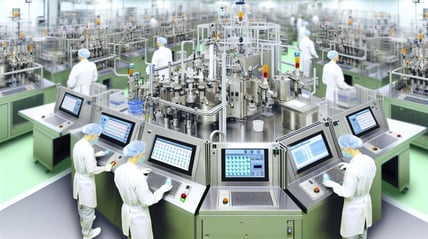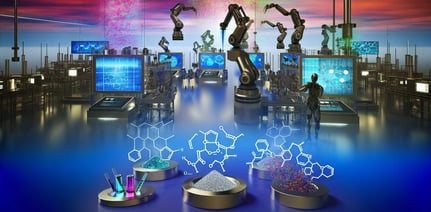Advanced Sensing Technologies for Process Optimization
In the realm of pharmaceutical manufacturing, the pursuit of efficiency and optimization is vital. As a Production Scheduler in this dynamic industry, you're well aware of the challenges and complexities involved in ensuring the smooth operation of manufacturing processes while adhering to strict regulations and timelines. In recent years, the integration of advanced sensing technologies has emerged as a game-changer in achieving these objectives.
In this blog, we'll explore the transformative potential of advanced sensing technologies and their integration with leading Enterprise Resource Planning (ERP), Supply Chain Management (SCM), and Manufacturing Execution Systems (MES) such as PlanetTogether, SAP, Oracle, Microsoft, Kinaxis, Aveva, and others.

Advanced Sensing Technologies
Advanced sensing technologies encompass a wide range of tools and techniques designed to capture, analyze, and interpret real-time data from various stages of the manufacturing process. These technologies leverage cutting-edge sensors, IoT devices, and data analytics to provide invaluable insights into critical parameters such as temperature, pressure, humidity, flow rates, and chemical compositions.

The Integration Advantage
Integration between advanced sensing technologies and ERP, SCM, and MES systems is where the true power of optimization lies. Let's look into some key benefits of this integration:
Real-Time Visibility and Control: By integrating advanced sensing technologies with MES systems such as PlanetTogether, SAP, Oracle, Microsoft, Kinaxis, Aveva, and others, Production Schedulers gain real-time visibility into manufacturing operations. This includes access to live data on equipment performance, production status, and inventory levels, enabling proactive decision-making and rapid response to changing conditions.
Demand-Driven Planning and Scheduling: Advanced sensing technologies provide accurate and granular data on production demand, allowing Production Schedulers to dynamically adjust schedules based on real-time requirements. By integrating with SCM systems, such as SAP Integrated Business Planning (IBP) or Oracle Supply Chain Management (SCM), Production Schedulers can align production schedules with demand forecasts, optimize inventory levels, and minimize lead times.
Predictive Maintenance and Quality Assurance: Integration with ERP systems enables Production Schedulers to leverage predictive maintenance algorithms to anticipate equipment failures and schedule maintenance activities proactively. Similarly, integration with quality management modules allows for real-time monitoring of product quality parameters, facilitating early detection of deviations and ensuring compliance with regulatory standards.
Optimized Resource Allocation: Advanced sensing technologies provide insights into resource utilization and efficiency, enabling Production Schedulers to optimize resource allocation across production lines. By integrating with ERP systems, Production Schedulers can automate the allocation of labor, materials, and equipment based on real-time demand and capacity constraints, maximizing throughput and minimizing costs.

Future Trends and Considerations
As the pharmaceutical industry continues to evolve, so too will the role of advanced sensing technologies in process optimization. Looking ahead, here are some key trends and considerations to keep in mind:
Adoption of AI and Machine Learning: The integration of AI and machine learning algorithms with advanced sensing technologies holds immense potential for predictive analytics and prescriptive insights. Production schedulers can leverage these capabilities to anticipate production issues, optimize resource allocation, and fine-tune scheduling parameters for maximum efficiency.
Expansion of IoT Ecosystems: With the proliferation of IoT devices and sensors, the scope of data collection and analysis will continue to expand. Production schedulers should stay abreast of emerging IoT platforms and standards to ensure seamless integration with existing ERP, SCM, and MES systems.
Focus on Sustainability and Green Manufacturing: Advanced sensing technologies can also play a crucial role in promoting sustainability and green manufacturing practices. By monitoring energy consumption, waste generation, and environmental impact metrics, production schedulers can identify opportunities for optimization and resource conservation.
Advanced sensing technologies represent a transformative force in pharmaceutical manufacturing, offering production schedulers unprecedented levels of insight, control, and optimization. By integrating these technologies with leading ERP, SCM, and MES systems such as PlanetTogether, SAP, Oracle, Microsoft, Kinaxis, and Aveva, schedulers can unlock new efficiencies, enhance quality assurance, and drive continuous improvement across the entire production lifecycle.
As we look to the future, the possibilities for innovation and optimization are limitless, making now an opportune time for pharmaceutical manufacturers to embrace the power of advanced sensing technologies.
Are you ready to take your manufacturing operations to the next level? Contact us today to learn more about how PlanetTogether can help you achieve your goals and drive success in your industry.


